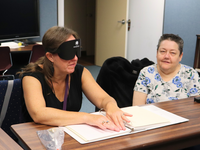Overview
In our Independent Living program, rehabilitation teachers work with blind and low-vision Iowans in their homes and communities. They provide the non-visual skill training necessary for a person to maintain their desired level of independence while living in their home and community.
- Our younger blind program is designed for blind and low-vision Iowans up to 54 years of age.
- Our older blind program is designed for blind and low-vision Iowans ages 55 and older.
Contact Kimberley Walford with any questions!
Non-visual skill training
Non-visual skill training may include:
- Preparing meals
- Managing home appliances
- Obtaining assistive devices
- Learning to navigate using a long white cane
- Learning braille and other techniques for accessing print material
- Managing money - including organizing and identifying cards and currency
- Promoting leisure and social activities
- Managing communication using smart devices - phones, iPads/tablets, and smart devices
- Labeling and managing household items - pantry items, clothing, personal care items, cleaning items, and mail
- Managing a secondary disability
Submit a Referral
Please use this form to submit a referral to the Iowa Department for the Blind. Enter the name of the individual being referred to the Iowa Department for the Blind. We will contact the person referred to discuss our services and answer any questions.
Email Address
